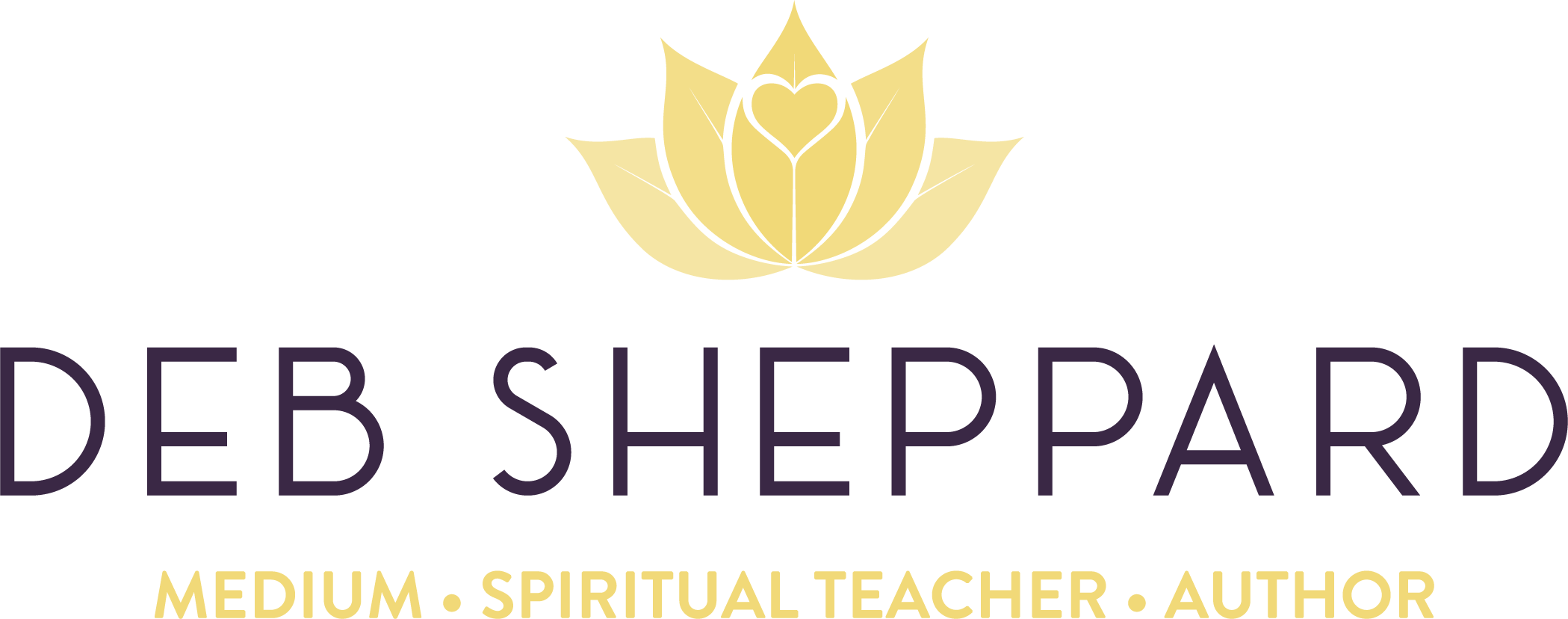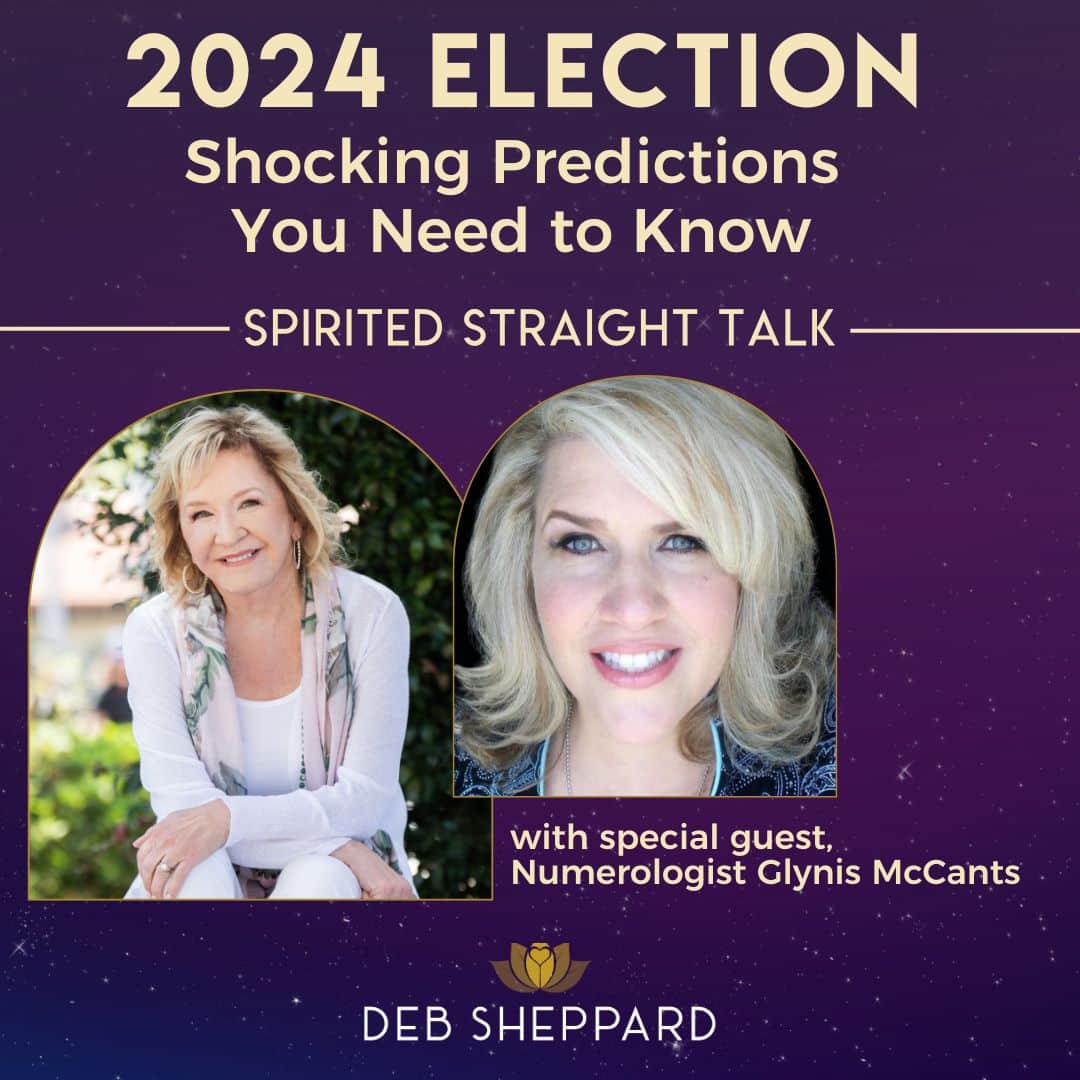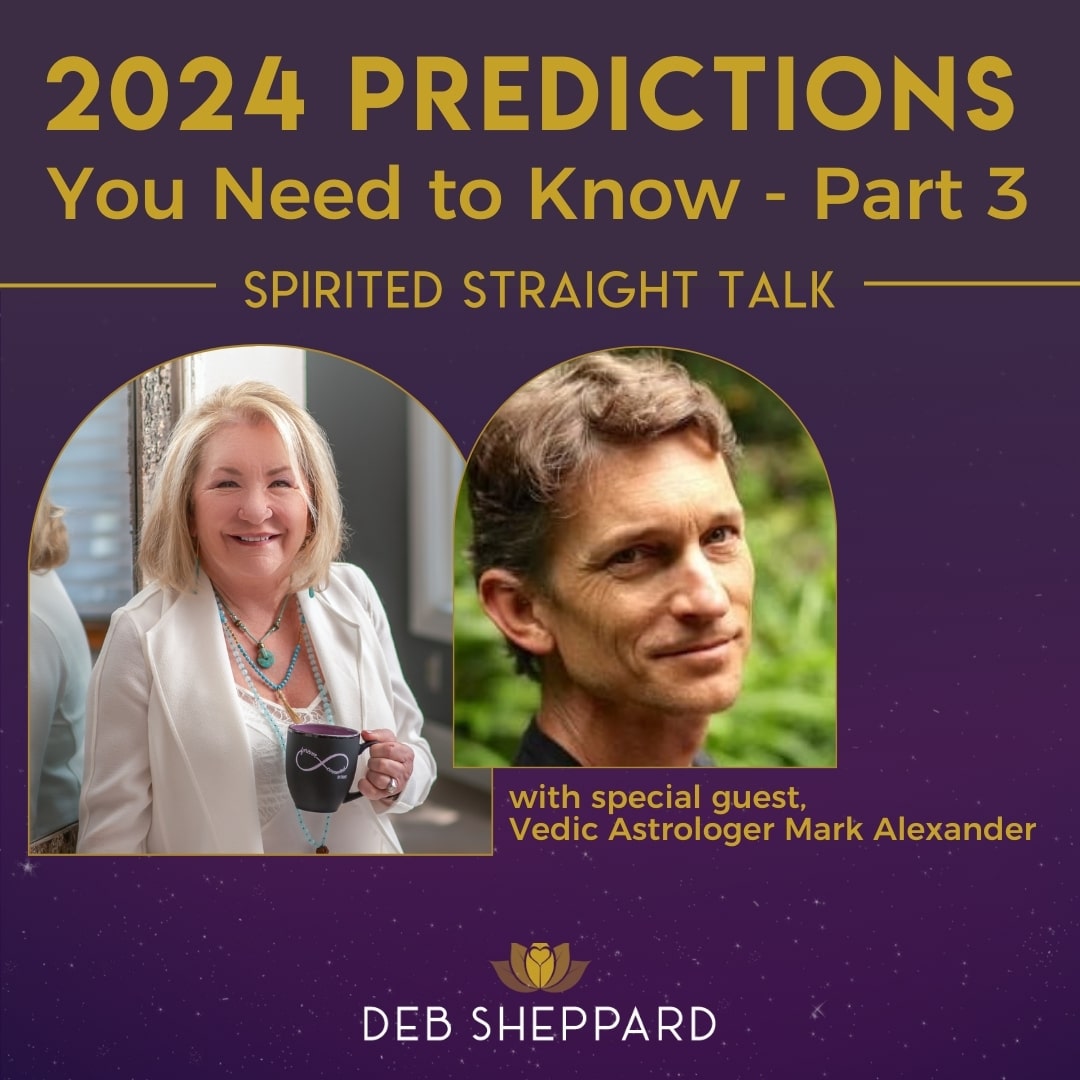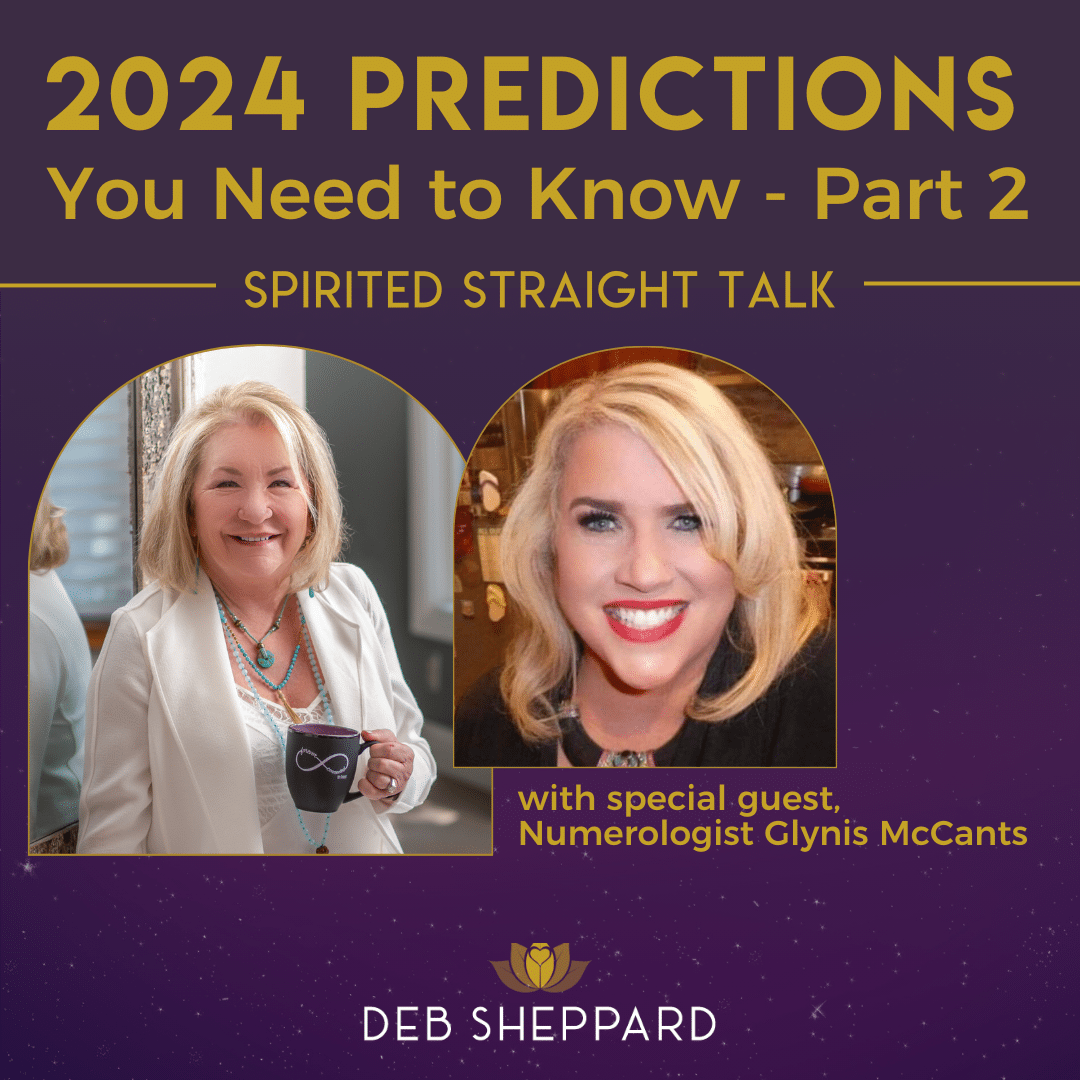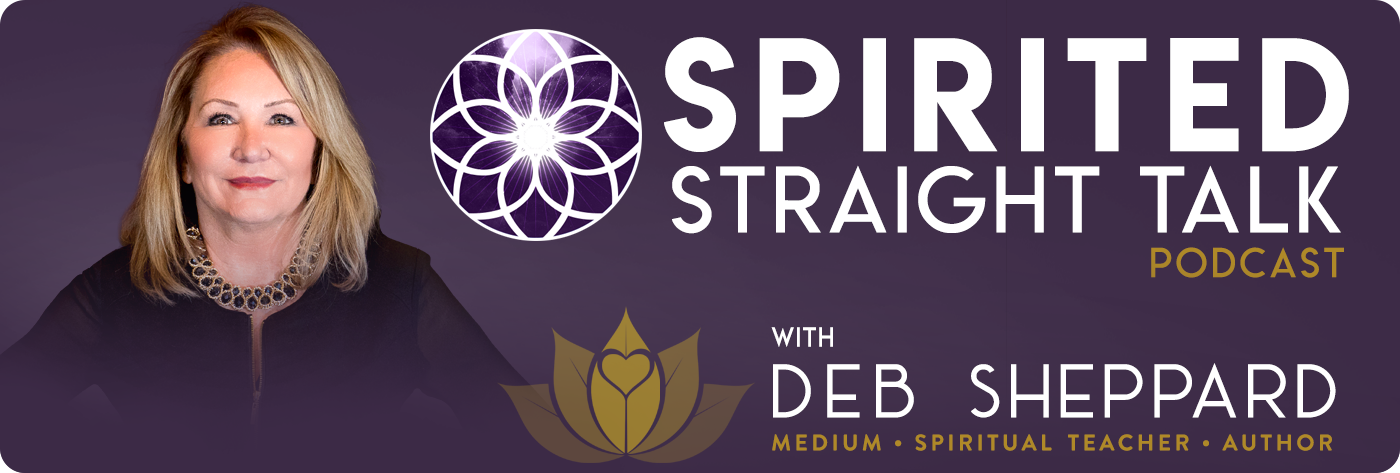
Why You Should Give Yourself Permission to Feel More Joy
1 (6s):
Welcome to spirited straight talk, the podcast to help you thrive with the help of spirit. I’m Deb shepherd, psychic medium spiritual teacher and author. Each week, I bring new insights to help you heal from loss, connect with spirit and turn setbacks and to triumphs. So let’s get started.
2 (27s):
I believe that having joy isn’t a need. What if you are grieving and feel that having joy isn’t part of the healing process or better what happens when, and I’ve had this happen where I should be grieving a certain way. And I’m said I’m having joy or people think, and I’m being judged for having joy. Have you had that happen? Me personally, I’m seeing that
3 (53s):
I’ve seen judgment around joy. Yeah.
2 (56s):
That, and there’s a lot of guilt around, unfortunately, regarding joys, people are suffering. There’s horrible things happening. So why should I have joy?
3 (1m 5s):
And you’re really good about that because I think you’ve been through and seen so much, but I remember judging people when I was younger, having joy after traumatic stuff for losses and stuff. I remember going, how could they be? So how could they
2 (1m 22s):
Feel nothing? Yeah. We think they’re not feeling anything. And it’s interesting. Cause people feel like if they don’t have that sadness, that people are gonna say, well, aren’t you sad about what happened? So I tell the story all the time, and I know you’ve heard the story when I teach your soul’s contracts, your purpose while you’re here. And this happened several years ago and her husband and wife came to me to want to know their souls contracts. And then I sat down with her and she’s a big business woman. And when did he come and find out? I said, well, your first contract is joy. And she got really mad at me. And I said, in your archetype, your, your main primary energy is that leader and the warrior.
2 (2m 8s):
And she wasn’t having it. She was not happy. I said, well, there’s more to the story or more to your contract, but this is the primary one. And I was thinking to myself at the time, like, maybe I’m really off maybe this, you know, maybe I’m getting it wrong. And I had to trust my intuition in my process. And so she kind of walks out of the office, not really happy. And I’m thinking, well, when her husband comes in, if it’s sort of the same thing, maybe we just won’t charge them because I’m way off. Well, the husband comes in and I do his session and talk about his contracts, why he here his archetypes. And he was so delighted and happy. And I’m like, okay, then this may be that she just doesn’t want to hear this. Right.
2 (2m 48s):
But I would love to have the contract of joy. I mean, that would be great for there’s more to the story, right?
3 (2m 53s):
It’s going to say, I don’t know. Do you want the contract of joy?
2 (2m 57s):
Well, this is what, yeah, this is what happened a year later, she thought she was having a heart attack and ended up in the ER and she’s laying there on the gurney. She says, she tells her the story that she’s looking up at the, the lights and thinking, I’m going to have a heart attack right here. And her husband kindly leans over and says, do you feel the joy yet? She came back and did some mentoring with me, but she said to me, my contract was joy. But only thing I could think of was working hard, getting the next promotion, doing more. How far could I go? She was, I wasn’t enjoying anything. I’m surprised she didn’t slap her husband.
2 (3m 38s):
But the fact that he leaned over and said that because he knew that her whole life was about working hard. Yeah. Driven that warrior and all that. So she actually quit her job and change things around. And she says, yes, I need to find more joy in my life. So if you want the contract of joy, that’s great.
3 (3m 56s):
It seems like it’s simple.
2 (3m 59s):
You have this really hard time in your life. And you’re thinking, this is what you’re here to learn. And we think, oh, joy is really easy. But for some people it’s really difficult to bring in the joy. And I really feel like joy is such an important factor. I assume
3 (4m 13s):
It’s really difficult. Yeah.
2 (4m 16s):
So people say, well, I want that to be, my contract was like, well,
3 (4m 20s):
Do you
2 (4m 20s):
Really do you really? Because you may have to almost have the heart attack to figure that out. But it’s really important to understand that it’s okay during grief when there’s changes, when things are difficult to have joy. And I think people forget that is one of the emotions. And it does help shift your energy when you bring in joy and laughter and good fun things into your life. And that joy can be anything. It can be, you know, watching babies laugh, you know, watching animals, watching funny stories, other people, making mistakes and laughing at them. That brings me joy,
3 (4m 55s):
Watching somebody slip on.
2 (4m 58s):
Yeah. That’s not really nice. But with that said,
3 (5m 0s):
I have, I have a cousin and an aunt though who cannot control themselves when they see something funny, like somebody slipping or arms and legs flailing to me, it’s horrifying to them. They think it’s a stair trickle. Even though somebody may be Hertz,
2 (5m 17s):
We all find joy in different ways.
3 (5m 19s):
It’s like a reflex. I’m like, why are you laughing?
2 (5m 23s):
Then we judge them. So I think part of the idea with this is what is your belief system around joy and having fun. And for a lot of people, they, they have this to do list. And if things don’t get done, then they don’t feel like they can have joy and fun. Right? And so that’s part of it too, is, is realizing that you’ll always have that list to do. There’s always things that are needing to be done, but taking time out of your daily life to create joy and have fun is so important for your energy. What I tell people a lot of times re regarding this, if you want to connect with your guides or your loved ones, the last thing you need is shame and guilt to feel to that connection.
2 (6m 8s):
And that’s going to do suburb the connection with them. The more joy and happiness you bring is going to allow your vibration to raise so that you can actually connect better with them. And your loved ones too. I don’t want you to be sad. They don’t want you to feel guilt just as if you cross over, what do you want? Your loved ones to think you want them to have a great life bringing in humor. Remember the great times. If you feel guilt around, someone’s passing, like I should have done more. I should have said goodbye. I bet all those stories. We tell ourselves, that’s going to lower your vibration and not allow you to feel and see the signs from your loved ones. And so jewelry is definitely part of that healing process.
2 (6m 50s):
They want you to say, remember those good times, remember the bad times, like you said, have some laughter when someone falls, maybe not that one. Exactly. But grief goes on so many different levels. So an ending of a marriage, even retirement, your children leaving the home, any kind of changes is considered grief because your normal is now changed. But having the, one of the tools is joy to find that cup half full. What can you get from this change? What can you learn from that? And you and I try to have a lot of fun when we get married, laughter is a big deal for us. And so,
3 (7m 29s):
Especially if we’re not feeling up to par, if we’re not feeling, then it’s always the go-to movies.
2 (7m 38s):
Yeah. Like what do we watch now?
3 (7m 41s):
Or the comedy or something.
2 (7m 43s):
Absolutely. And of course I do a lot of dad jokes, which really brings you a lot of joy. I know that. So that’s not the case with, with that. I guess
3 (7m 53s):
We’re going to run to the store. Well, why don’t you take the car?
2 (7m 60s):
What you want to do too, is when people may think that you’re having humor or you’re finding joy and they’re judging you, let them know maybe why you’re doing that because they may not understand. And it will allow other people to say, I can have joy too. When I’m grieving. I don’t have to always be in this sorrow, in this terrible place of thinking that I have to always be sad and depressed and not happy about things, the situation of brain and happiness and joy into the grief process. She allows your body to expand and release. That tension helps you sleep. Get more clarity, find some focus and a purpose and reconnect with the world basically.
2 (8m 44s):
And it’s okay to have those moments of sadness. But when you bring in that joy, in the fun and the laughter, your body’s actually saying, I’m okay with this. I’m going to find out how to find my life into a new way. Because when we feel devastated from the ending of something, we feel like our life is over. We feel like, how do I move ahead? With a way you get your answers is shifting that energy and having the belief system that is absolutely 100% okay. To bring in those energies into your life. So having joy is powerful. We both have our things that we bring joy. You love the plants, you love the cooking.
2 (9m 26s):
And she’s actually has a little addiction issue with the plants, but just kidding addiction. Now she does it. We love it because it’s all around our home. It brings in that life. It’s brings us joy
3 (9m 38s):
And surrounds surrounded by flowers.
2 (9m 41s):
It’s wonderful. Yeah. So whatever it is, and if you feel like, well, I really can’t spend money to go find some joy. There are so many things you can do by creating that atmosphere. And bottom line is it’s watching a movie go into a hallmark and pull out the cards that are funny. Do you ever see someone standing there like laughing and crying over the funny cards? Yeah. So it doesn’t have to be something big. It can be something very simplistic. And that’s what we want to talk about. So I have some ideas, like 10 ideas of how to shift that energy. So you can say and allow yourself, that’s really it. Giving yourself permission to say, guess what? It’s okay for me to do this.
2 (10m 21s):
And I don’t need someone else’s approval to be able to do these things. So how do you, how do you change the energy? One? How long do you want to carry the shame and guilt? So this is not about so much changing or bringing in joy, but it’s also, why are you carrying that around? So realizing, yeah. Like, is this really bringing a value to you? Does that help other situations? This has helped you change if you’re constantly beating yourself up that negative talk and then you also feel like I don’t deserve because a, B and C stop that story. Give yourself permission to say, we all make mistakes. We’re here to learn. And that’s the bottom line to what benefits are you receiving from feeling this way?
2 (11m 4s):
So that shame and guilt, why are you telling the story? It’s basically we tell the story because we’re the victim. Or we want people to understand where we feel like, oh, my life is stuck because of the story. So you want to think about when you feel this way, like the shame and guilt, why are you holding onto that so long? What’s the value of it. And I know that doesn’t sound like bringing joy in, but it’s stopping that process of being paying attention and going, why do I keep bullying this into my life? Of course, we teach the law of attraction. If you could keep putting that out there, what’s going to happen.
3 (11m 38s):
What’s going
2 (11m 39s):
To come. It’s going to come right back. Right. So by shifting that, you’re going to allow the energy, the space for that joy to come in, to find that laughter to look at opportunities, I guess like with your relatives, people falling down, oh my
3 (11m 52s):
Gosh, I get so mad at them.
2 (11m 57s):
So if they listen to this, that we’re not putting their names out there. So, and that was number three. If you’re giving power to the story versus your healing process and what to do to make these changes. If we keep going to shame and guilt, we keep telling the story, we’re reliving that episode versus finding the lessons from it. How do we change? How do we decide to move forward in our life? Are we letting that hold us back because of that story. And when you see people, 10 years later in the Tony, the same story, you’re thinking
3 (12m 33s):
They’re still, they’re
2 (12m 34s):
Still there. Are you kidding me? It’s like, they
3 (12m 37s):
Not learn to anything.
2 (12m 38s):
It’s like wearing clothes from the seventies that haven’t been reinvented. Right? You’re still there. You’re still like, you take the photo and you’re like, wow, you didn’t, you never left the seventies. Right? Right. A lot of people have gone to the relatives house. You know, the, the house that stays the same over syndrome, they have the plastic over the furniture, whatever
3 (12m 58s):
It’s like preserve,
2 (12m 59s):
Preserve. Don’t preserve that energy. Don’t keep it so special and, and sacred that there’s no shift in your life because how long do you want to live in that? Right. That’s really the question for, is there a better way than carrying these feelings of sadness? Yeah. It’s stop telling the story. What are the things I had people do is record their story and then listen to it several times a day. You will get sick of it because that’s what the universe is hearing. So
3 (13m 30s):
To record your story and listen to it so you can know what you’re sending out to
2 (13m 35s):
And what other people are hearing. And it’s one of the most difficult exercises I have students do, but they say it changes everything within moments. They like, they just like, I can’t listen to it. I want to tell my story differently. And number five, what outcome do you want to have is doing the same thing, giving you the best results. So if you’re wanting the situation to change, if you’re wanting the guilt and shame, if you’re wanting the warrior, the heaviness, the negativity to continue, it really is about shifting it. Does the story still serve you. And these are all sort of similar, but it’s also reminding ourselves, why do we want to keep staying right there? What’s the value that you’re bringing.
3 (14m 15s):
So, and you might even have this written down, but the suggestion that you always give to write your story down and then release it,
2 (14m 25s):
Actually that’s not written down.
3 (14m 26s):
Good release it
2 (14m 28s):
To no, we have to live ceremony or behind
3 (14m 31s):
Flush it down the toilet,
2 (14m 32s):
Bury it, Berea, whatever you need to do so
3 (14m 35s):
That you can release that
2 (14m 37s):
And do it as many times as you need to. We had a podcast on cord cutting. That’s very similar. So if you’re feeling all this guilt and shame about something, maybe the cord cutting can also benefit from telling that story. Yeah. I guess what it is is that we want people to say, yes, you did the right thing or yes you’re. Okay. And so we tell those stories to get approval when it’s actually just reliving over, it’s like Groundhog day, quit living that same story. Number six, are you managing your experiences based on what others may think. That’s a big judgment thing. So people may feel I’m moving on from this. I’m no longer going to hold on to this relationship, the job, the, the ending of someone passing and people think sometimes that you should grieve longer or grieve shorter.
2 (15m 27s):
Some people say, well, it’s been three years, shouldn’t you be over it? So they’re just judging. They’re just showed you now. Or you move on and go, wow, she’s already found a life again. And they’re like, wow, that, that happened. That was quick. People have a perception without knowing your experience, what you go through. And everyone’s going to have a different experience. And when we talk about grief, especially there is no right or wrong, how you grief, but bottom line, if you’re not also shifting that energy and bringing in a change, you’re never really going to heal from that situation. And you’ll stay stuck. So carrying that experience is one thing, but reliving it is a different experience.
2 (16m 8s):
Yeah. I love this one seven reflect on what you were learning in the situation. And I think because I teach those contracts, what our life purpose is here. It’s about what did you learn from that? What would you do differently next time? Would you have let that relationship go on? As long as it did, would you have maybe right. Would you have done something different with someone that was maybe very sick? Would you have a conversation or do things differently before someone passed? And that’s where we need to look at that as what would we do? What did you learn? What were you taught? How would you treat other people? It might be when this is happening to somebody else and it’s happened to you.
2 (16m 49s):
Maybe you show them by example, too. But part of it is allowing other people to say, it’s okay, the way you’re managing it, eight, do you really want to put more energy on what’s not working? And this is the, this is like what we’re talking about. We put so much energy into that situation. We rehash it, we rehash it. And that energy is limited. So do figure out where you want your energy to go. So imagine that you had a thousand dollars, where are you going to put that energy? Oh, I’m going to go back to my pity party. I’m going to put a hundred dollars there or are you going to put it into something joyful or fun? Because it’s energy and energy time thoughts, those kinds of things.
2 (17m 33s):
Did you have a thought there? You, I was thinking, I know I can see it. Nine. If you feel guilt is about the passing of someone, including your fruit rabies, then begin to ask questions about what you believe. So you and I believe that life continues souls continuum. If you don’t believe that souls continue, you may want to revisit what you believe in. So if you believe that there’s an afterlife, why are you holding onto such guilt and shame when you can basically talk to them and let them write the letter or go see a medium, whatever that is to release that energy because they’re watching us, they don’t carry the same thing. Things that happen on the earth plane, when they cross over, they’re not attached to us, not showing up a certain way.
3 (18m 18s):
They’re not attached to the lessons. We’re still learning. Yes.
2 (18m 22s):
Yeah. That lesson of, like we said, the joy
3 (18m 24s):
10 judgment or abandonment,
2 (18m 27s):
All of the lists. I also think this is important. I, when you have had significant losses or, or things that are difficult, when you show up and show people that, that doesn’t define them, that experience isn’t definement and you bring in joy and you begin to heal and you shift that. It teaches other people that it’s okay to do the same thing.
3 (18m 48s):
So you’re saying your experiences don’t define you.
2 (18m 52s):
And if you set the example, he gives other people permission to do the same thing. Because as a community, we want approval. So if everyone is really miserable, everyone thinks, oh, we all have to be miserable,
3 (19m 5s):
No joy,
2 (19m 6s):
No joy versus saying, you know, I’m really sad about the situation. I’m sorry that this marriage in last or the job, or the loved one crossed over. But if we say, but that doesn’t define me and guess what? I can still find purpose from this. I can still move forward in my life and have these great experiences that tells other people it’s okay. Yeah, because we do look at our community for that approval.
3 (19m 31s):
That’s true.
2 (19m 32s):
The other thing about having joy, it doesn’t mean that you’re not grieving. It doesn’t mean that you can’t be sad. It doesn’t mean that you’re having those bad days. What it means is that you can also bring that tool, that element into your life, going through that process. It’s just not one way. And for a lot of people, who’ve lost children. There’s no timeframe, especially for them to, to grieve. And when they bring in joy doesn’t mean that they don’t miss their child. They just know that they have to carry on. And so if this person is grieving and sad at times throughout their entire life, that’s okay. It doesn’t mean you’re doing it wrong,
3 (20m 11s):
But bringing joy in helps you connect with your loved one, if that’s what you desire. So that’s important. Yeah.
2 (20m 18s):
Yeah. So a medium, we’re not attached to the loss of your loved ones. So when we give a rating or when I give a reading, I’m not attached. So my energy is a higher vibration, but the more you bring your energy up, the more you can connect with them because there’s, you, we don’t have that lower vibration. It’s like, I would say, it’s a frequency that you’re, you’re, you’re bringing into your you’re tapping into them. Really. The best advice though, is to look for joy people falling in
3 (20m 46s):
No
2 (20m 47s):
Slimy, finding enjoy though the other day, you and I were at a little strip mall and we’re walking in, there was a homeless man sitting on the bench, right there in the stores with a big smile on his face. And unfortunately, I didn’t have any cash with me, but he, he showed me the peace sign held. It was two fingers. And I smiled and I said, peace out and held up my fingers. And he goes, no one has done that. Thank you so much. So to me, it’s always paying forward to, and when you see joy in something else and somebody else gives you that feeling of, I made a difference in someone’s life. And that was so simple. Yeah. You brought him joy. He just smile. And then of course we went and got changed or money and I came back and he wasn’t there.
2 (21m 28s):
But to me, that was the true gift. And it was a reminder. We don’t have to do much to bring joy to somebody else. When we give joy, we get it back in return. And that’s really the gift to all of us. So look for joy, find opportunities, no guilt. When you have joy. And thank you for joining us, I hope you can continue to listen to her podcast, spirit of straight talk.
1 (21m 56s):
Thank you for listening to today’s episode. I hope it inspired you. If you enjoyed our conversation, make sure you subscribe so that you get notified of new episodes and let’s get connected. Visit Deb shepherd.com for more insights, support workshops, and a book, a session with me. And finally, always remember your loved ones in spirit, or just a thought away, even though they’re on the other side, they’re always by your side.
